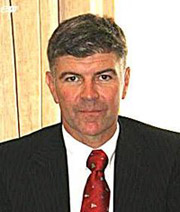|
Experience offers valuable lessons. In less than 500 days, what can Chinese organizers learn from Sydney who beat out Beijing in hosting the 2000 Olympic Games? What can be done to realize the Beijing Olympic slogan "One Dream, One World"?
In a recent interview with Beijing Review, Glenn Bourke and George Blake, two Olympic experts who participated in the preparation and operation of the Sydney Olympics, shared their views on the abovementioned questions and the future of water sports in China.
Beijing Review: The Olympic atmosphere in China is overwhelming. In your opinion, what advantage does Beijing have in preparing for the Olympics?

Glenn Bourke: Some of the things Beijing has already done beautifully, for instance, the venues-they finished early so they can be tested early; the fantastically wide layout, etc. That is a really good starting point for the Olympic Games.
And the transport; you gotta make sure that's done properly. The other thing that we can't do anything about is the security. We just do the best we can, we use the best intelligence, and just hope it is secure. But I'm sure that in this country security is as thorough as anywhere else.
George Blake: The advantage is the enthusiasm of the Chinese people. It seems that they are open to the outside world; they want to acquire all the necessary information. Any information I got, they take it in quickly and they want more.

The preparation work, from what I've seen, is primarily based on Tsingtao. I've visited Tsingtao for a couple of times. They put a test event last August which was a big success, and the next test event will be held in August this year. They follow the same model of Sydney's two test events prior to the Olympic Games. Doing test event is really important in order to bring the venue up to speed to meet the requirements of the Olympic Games. So I'm sure that they are following the right plan. The last time when I was in Tsingtao was late last year. There was a wonderful venue. I've seen some of the venues here in Beijing; it looks fantastic as well. So I think the BOCOG (Beijing Organizing Committee of the 2008 Olympic Games) will present a very successful Olympics.
Both of you have participated in the preparation and operation works of the Sydney Olympics. Is there something that Beijing can learn from Sydney? What else does Beijing needs to do to better implement the slogan "One World, One Dream"?
Glenn Bourke: There are many things that Beijing Olympics will probably do better than Sydney, I hope so and I expect so.
Australia did a very good job of running the Olympics. There were many communicative people; there was a reasonable budget as well. The sailing test event was the first test event of all the Olympic Games two years before the 2000 Sydney Olympics. Basically, we did a nice job with that.
Attitude is one thing that you can learn from Sydney; it is really important. The Sydney volunteers were incredibly helpful. They were genuine in the desire to help you get things done. That was the highlight. That made it easy for the athletes; makes them feel good and that contributes to the whole atmosphere of the Olympics.
You can learn not to be too big. Don't make it huge if it only needs to be big. It is big; it's big enough anyway. So don't overcomplicate it by putting layers, layers and layers in.
George Blake: Each subsequent Olympics can learn from the last one; the good points and the bad points, so they get better each time. The transfer knowledge program of the IOC (International Olympic Committee) will continue.
One thing that is really important is the communication and coordination between the IOC and the local Olympic Committee - the BOCOG here in China. What normally happens is that the planning was so strict from the IOC. They don't leave anything to chance. I know that the IOC Coordination Committee is in Beijing at the moment working with the BOCOG. I'm sure they are talking about this right now and both parties will be happy with the direction of the Beijing Olympics.
What are the things that you can learn from Sydney? The one thing you can't predict is the weather. We were lucky in Sydney to have pretty good weather. That is the hardest thing. There are some things that you can't plan for. But that is the event. The unpredictability makes it so much fun.
| 